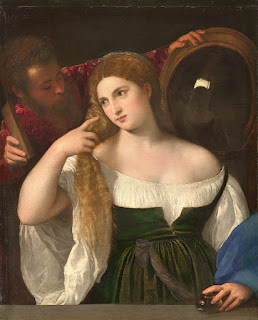The Wheel of Time TV series begins in a little village in a fictional world. The villagers are (by real world standards) multicultural: Asian, Black, white, Hispanic, etc.
This is because filmmakers are consciously trying to diversify casts, which is a good thing.
However, by the standards of a "medieval" world, that sort of multiculturalism is pretty much impossible, since people generally spent their lives within 20 miles of their own home and intercontinental travel was impossible for everyone but the insanely rich. (Also, the village in question is not a center of trade, though, it is at the intersection of some crossroads, in the book -- it has an inn, for that reason. This would maybe explain multicultural visitors, I suppose -- but following the medieval formula, it ain't no London. And even medieval London would have been less multicultural than this town is depicted in the show.)
You could argue: "Yeah, but Chris, it's fantasy..." However:
Coleridge is the inventor of the phrase "suspension of disbelief" -- in other words, we read fantasy and we suspend our disbelief when something happens that does not fit the rules of the real world. So, we could look at the incredibly diverse group of villagers and say, "Meh, it's a fantasy world. Maybe they just come out looking differently at birth."
Quite a while later, though, Tolkien came along and said that, for good fantasy, we should not have to suspend our disbelief. He called for the creation of a "secondary world" in which all that happens fits the rules of that world and feels like an organic part of it. Example: the Ents (essentially tree-people, if you are not a Tolkien reader) fit in to Tolkien's Middle-Earth. When we see them, we don't say: "There is no such thing as Ents, that's stupid" because, they fit the parameters Tolkien has created. However, the talking trees who throw apples at Dorothy in The Wizard of Oz movie would not fit in Middle-Earth. They would, if you will, break the spell of the secondary world and force us into suspension of disbelief, thereby diminishing the quality of the fantasy.
For me, the secondary world of The Wheel of Time is flawed (TV version), because the diversity in the village does not make logical sense, and it is jarring.
I want to be clear, even at the cost of repeating myself, as I am: I think multicultural casting is a good thing; I just think we should think hard about it when creating an artistic context, as in a TV show of this nature. Fantasy really depends on the "secondary world," I think. When that fails, the art suffers.
A more logical choice would be to cast a non-white village, I think. Use only Hispanic actors or Black actors or Asian...etc. Robert Jordan never said (in the books) that the villagers were white. And since it is a fantasy world, I'd argue that non-white cast would be more effective in establishing other-wordliness: white people have been historically in charge in the real world. Why shouldn't non-white people be in charge in fiction? It just might help change things here in the real world.
I think is it superficial to say: let's just throw a bunch of nationalities together so we can say we contributed to the cause. It might be more effective (show to show) for kids of color to see people who look like them front and center. This way we are not diminishing the quality of the storytelling AND we are sending kids a message: the world (a world) can look very different than ours. However, for a show done in the present, the cast should look like our world, which most often is an ethnically diverse place.
In fact, maybe that should be the rule: to help the audience believe any TV show, the cast of any show should reflect the world is is trying to conjure. It would be foolish to cast Asians as victims of the African slave trade... but, if you make a movie about a suburban high school, chances are everyone is not white... And, make sure actors of all backgrounds have a shot. I think the talk about Ibris Elba being the next Bond is interesting in that regard. (Don't know if it is true that he will be, by the way.) Does Bond need to be a white guy? Why? Did Dr. Who need to be a man? Heck no. The Doctor regenerates. Who ever said he had to regenerate as a man?
I do recommend The Wheel of Time. If you like classic, epic fantasy and were not lured in by the tawdry meandering, amoral world of Game of Thrones, this show will do the trick.


